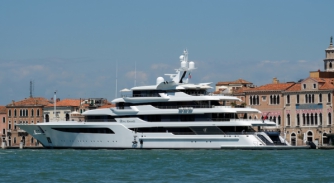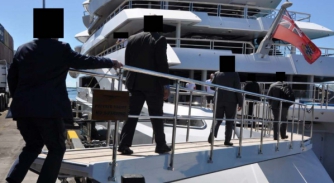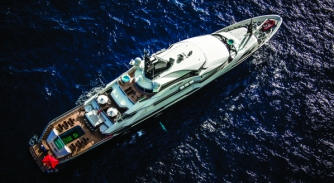Arrest in the Med: when the harbour writes the headline
Deepening the Croatia playbook, and how it compares across key Mediterranean forums – with a sanctions twist…
Arrest is the maritime red card: sudden, summary and – if you’re unlucky – season-ending. What tips cases in the Mediterranean is not the size of the claim so much as where the yacht happens to lie. The lex for – the law of the port – sets the threshold for immobilisation and the choreography for release. Understanding how the main Med jurisdictions actually operate, and how evidentiary standards from the sanctions arena are bleeding into harbour practice, is now part of responsible ownership.
Croatia under the microscope
A familiar Adriatic storyline starts with a charter-fee dispute. The charter company is the alleged debtor; the yacht sits on an owner-SPV balance sheet and is merely placed into service. In Croatia that corporate distinction is not window-dressing, it is decisive. The Croatian Maritime Code ties arrest, as a rule, to ships owned by the “personal debtor” at the moment the petition is lodged, save for recognised exceptions such as maritime liens or a registered mortgage. Where that ownership link is missing, arrests struggle to survive on appeal. In practice, owners who can produce a clean title chain and no-lien evidence tend to win the release.
Croatia then does something many owners wish other states would: it disciplines wrongful arrests with strict, fault-independent liability. Once an interim measure (for example a yacht arrest) is lifted as unfounded or the merits claim ultimately fails, the arresting party is liable irrespective of negligence or bad faith for the owner’s loss. There is also a short, 30-day window to claim those damages within the same security proceedings (after which you sue separately). In other words, release is not the end of the story; compensation is part of the script.
Owner’s takeaway
Croatia rewards clean structuring and tight paperwork. Arrive in the Adriatic with your register extract, SPV chain, charter/management contracts and lien checks ready to deploy; if an arrest is lifted, move quickly on the 30-day adhesion track for damages.
How the rest of the Med stacks up (what really changes by port)
The Mediterranean does not offer a single climate. It offers micro-climates, each harbour with its own pressure systems.
• France. Expect speed on the way in and friction on the way out. French courts will immobilise on a summary showing; damages for wrongful arrest are exceptional and usually turn on bad faith or malice by the arrestor. The practical strategy is to engineer a release (often against security) rather than banking on compensation later.
• Italy. Broadly similar in tone to France. A vessel can be arrested for maritime claims (per the 1952 Convention and domestic law), but damages for wrongful arrest are far from automatic and often depend on aggravated fault. Counter-security can be ordered, but practice varies by court.
• Spain. Spain moved on from the 1952 regime; it applies the 1999 Arrest Convention and anchors practice in the Maritime Navigation Act 14/2014. The catalogue of arrestable claims is wider than under 1952 and the domestic statute gives courts modern tools good for efficient security, but also mapping clearly how and when a claimant must sue on the merits. Owners should expect brisk procedures and plan their security pathway in advance.
• Malta. Malta’s COCP Article 742B provides a detailed list of grounds for in rem (against the thing) arrest, and the courts deliver fast, form-driven relief. It is superb when you are claimant; as owner, the answer is preparation: an agreed LOU format, a bank able to issue on-demand guarantees, and designated signatories. Once acceptable security is tabled, release follows the paperwork.
• Greece. Piraeus runs a disciplined two-stage process: a provisional order may secure the status quo, followed by a security-measures hearing. The Code of Civil Procedure emphasises that provisional measures must not amount to full satisfaction of the claim; urgency or imminent danger must be shown. This framework gives owners real arguments on proportionality, yet does not stop a swift interim hold if the test is met.
• Turkey. Turkey is now a party to the 1999 Arrest Convention; domestically, the Turkish Commercial Code already mirrored much of the 1999 model even before ratification. The upshot: arrest is available only for “maritime claims” (numerus clausus), and courts often require counter-security. Owners should be ready with security and counsel who know the post-2019 practice.
• A German benchmark (not a Med port, but instructive). Germany pairs a conventional arrest test (§ 917 ZPO) with strict liability for wrongful arrest (§ 945 ZPO). For owners, Germany demonstrates the difference documentation makes: liability may be fault-independent, but quantum still has to be proved.
A harbour-hold grounded in sanctions is not the same as an arrest.
Sanctions “freezes” ≠ arrests – but the evidentiary standards spill over
A harbour-hold grounded in sanctions is not the same as an arrest. Yet the evidence discipline developing in sanctions litigation is shaping expectations across the waterfront. In Tokareva v Council (T-744/22, 11 Sept 2024), the EU General Court sharpened two concepts:
• “Association” requires current common interests; family ties alone do not suffice.
• “Benefit” means non-trivial, present advantages; historic benefits predating February 2014 will not carry the case, and advantages must persist at the time of the listing.
For owners, managers, marinas and service providers this matters. When someone hints at “sanctions proximity” as a reason to withhold services or to effect a de-facto immobilisation, it is reasonable to insist on specific, timely evidence meeting these standards. The spillover is simple: assertions are out, substantiation is in.
Putting it together – a release-first philosophy
Across these forums a pattern emerges. France and Italy mobilise quickly but compensate cautiously; Spain and Malta offer efficient tools that reward those who arrive with ready-made security; Greece builds proportionality into the very idea of interim relief; Croatia stands out for combining a narrow ownership nexus for arrest with strict, swift consequences for wrongful measures. The smart owner does not try to flatten these differences. Instead, you plan into them:
• Engineer the release mechanics into your contracts. Name an acceptable LOU form (P&I), an on-demand bank guarantee template, signatories and time limits for lifting an arrest when security is posted.
• Carry your evidence. Keep the ownership chain and no-lien picture current; maintain contemporaneous charter/APA records for loss quantification (vital in places like Germany; persuasive in settlement everywhere).
• Know your ports. Adjust routes where ex parte practice is notoriously swift; build a counsel/agent network that can file within hours, not days.
Do that, and even in a sanctions-shadowed season the harbour’s law won’t write the ending – your preparation will.
As an open-source platform we offer an industry-wide invitation to anyone and everyone in our sector to share their knowledge, experience and opinions. So if you have an interesting and valuable contribution to make, and would like to join our growing community of guest columnists, share your ideas with us at newsdesk@thesuperyachtgroup.com
NEW: Sign up for SuperyachtNewsweek!
Get the latest weekly news, in-depth reports, intelligence, and strategic insights, delivered directly from The Superyacht Group's editors and market analysts.
Stay at the forefront of the superyacht industry with SuperyachtNewsweek
Click here to become part of The Superyacht Group community, and join us in our mission to make this industry accessible to all, and prosperous for the long-term. We are offering access to the superyacht industry’s most comprehensive and longstanding archive of business-critical information, as well as a comprehensive, real-time superyacht fleet database, for just £10 per month, because we are One Industry with One Mission. Sign up here.
Related news
.jpeg)
Phi’s appeal sinks at Supreme Court in watershed ruling
Following a landmark judgement, the stranded superyacht remains detained in a London lock, with its future cast into further doubt
Fleet

Relocated Royal Romance under armed escort amid legal reforms
The seized superyacht is being moved for maintenance. But is Kyiv preparing it for a flash sale?
Fleet

Turning legal limbo to public value
Emmanuelle Votat calls for a European framework to manage frozen and seized yachts ethically and transparently based on lessons from judicial practice in France
Opinion

Can frozen yachts be thawed?
Sanctioned yachts have been locked in limbo for years, but could a new legal mechanism allow legitimate sales?
Owner
Related news
Turning legal limbo to public value
8 months ago
Can frozen yachts be thawed?
10 months ago
NEW: Sign up for
SuperyachtNewsweek!
Get the latest weekly news, in-depth reports, intelligence, and strategic insights, delivered directly from The Superyacht Group's editors and market analysts.
Stay at the forefront of the superyacht industry with SuperyachtNewsweek



